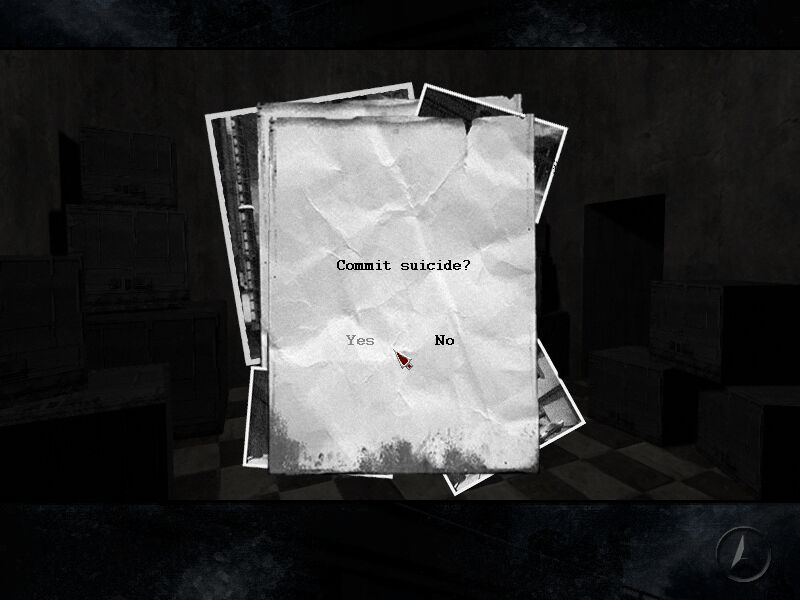Retro Replay Review
Gameplay
The Dead City unfolds as a concise yet gripping first-person point-and-click adventure, where exploration and investigation blend seamlessly. Players navigate the crumbling streets and abandoned apartments of a polluted metropolis, clicking on key objects to gather clues and pieces of dialogue. The controls are intuitive, with contextual cursors that highlight interactive hotspots, ensuring the focus remains on the story rather than wrestling with cumbersome mechanics.
(HEY YOU!! We hope you enjoy! We try not to run ads. So basically, this is a very expensive hobby running this site. Please consider joining us for updates, forums, and more. Network w/ us to make some cash or friends while retro gaming, and you can win some free retro games for posting. Okay, carry on 👍)
Puzzle design in The Dead City leans heavily on environmental storytelling. You’ll examine shattered fragments of your girlfriend Tess’s life—torn photographs, blood-stained journals, and cryptic symbols scrawled on dingy walls. While the puzzles never reach mind-bending complexity, they thoughtfully reinforce the game’s oppressive atmosphere, requiring you to piece together timelines and motives from scattered evidence.
A notable strength is the pacing. In just a few hours, you’ll move from fumbling in a mental ward to stalking the toxic alleyways for a sadistic killer. There are no unnecessary fetch quests or prolonged inventory shuffles; every step drives the investigation forward. The concise length keeps tension taut, though players seeking sprawling worlds may find the brevity a drawback.
Graphics
The Dead City’s visual palette is drenched in grays, sickly greens, and crimson splashes that evoke a rain-soaked nightmare. Polluted droplets drip from broken neon signs, pooling into rivers of toxic sludge that glow with eerie incandescence. The decaying architecture—rusted metal girders, crumbling concrete, and flickering streetlights—immerses you in a world on the brink of collapse.
Texture work and lighting play pivotal roles in conveying the game’s oppressive mood. Varying light sources cast jagged shadows across grimy walls, heightening the sense of unease as you search for clues. Character models, particularly the haunting visage of Tess’s corpse and the hollow-eyed suspects you encounter, are rendered with unsettling detail, underscoring the narrative’s visceral horror.
Performance remains stable even in the most graphically dense environments. While The Dead City doesn’t push cutting-edge hardware limits, its art direction and atmospheric effects—like rain streaking down cracked windows—excel at storytelling through visuals. The result is a small-scale but visually coherent presentation that maximizes its dark, futuristic setting.
Story
The narrative thrust of The Dead City centers on a broken protagonist haunted by the gruesome death of his girlfriend, Tess. When you first awaken in a mental ward, scarred by drink and drugs, the world outside seems just as shattered as your mind. Each new victim found with severed veins and gouged eyes mirrors the brutality inflicted on Tess, fueling your obsession to uncover the truth.
Dialogue and environmental clues gradually reveal a conspiracy that extends far beyond a single serial killer. Hints of corrupt corporations, clandestine experiments, and mutated wildlife leak through the cracks in overheard conversations and discarded documents. This layering of personal grief with systemic decay elevates the plot, keeping you invested in far-reaching stakes even as the killer’s identity looms large.
Though the story is compact, it resonates with themes of vengeance, loss, and moral ambiguity. You’ll question your own reliability as a narrator—after all, the protagonist’s addiction-fueled haze blurs the line between vivid memory and hallucination. This psychological slant enriches the investigation, making every revelation feel earned rather than handed to you on a platter.
Overall Experience
The Dead City delivers a taut, atmospheric adventure that punches well above its modest running time. Its focused gameplay and tightly woven story create a compelling detective narrative, perfect for fans of noir horror and futuristic dystopias. While some players might yearn for longer play sessions, the game’s brevity ensures that suspense and intrigue remain undiluted from start to finish.
Strengths lie in the game’s immersive environments, thoughtful puzzle integration, and the brooding, psychologically driven plot. Occasional limitations—such as the lack of branching paths or deeper side content—are offset by polished presentation and consistent pacing. The Dead City feels like a complete package rather than an unfinished prototype, offering a satisfying conclusion to Tess’s tragic mystery.
For those seeking a compact narrative experience with strong atmosphere and engaging detective work, The Dead City is a worthwhile venture. It may not redefine the genre, but it stands as a solid example of how efficient design and evocative storytelling can create a memorable journey through a world drowning in its own corruption.
 Retro Replay Retro Replay gaming reviews, news, emulation, geek stuff and more!
Retro Replay Retro Replay gaming reviews, news, emulation, geek stuff and more!









Reviews
There are no reviews yet.